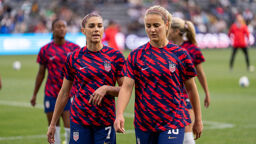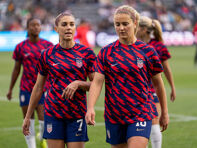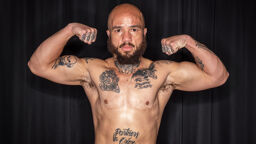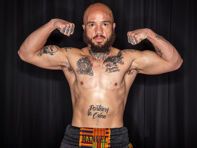 Brendan (left) and Patrick Burke |
 |
"There are a lot of gay athletes out there and gay people working in pro sports that deserve to know that there are safe environments where people are supportive of you regardless of your sexual orientation."- Brendan Burke
About a week before John Buccigross’s article was published on ESPN.com, I called my brother for an important talk. Through Buccigross, Brendan was about to come out to the entire sports world. My father, Enrico Blasi (Head Coach of the Miami University hockey team), Brendan and I had done our interviews and given Buccigross plenty of quotes to best tell Brendan’s story. Now I needed to talk to Brendan about the consequences of this decision.
Brendan was weighing two careers: politics and hockey management. Neither arena is generally viewed as gay-friendly, and our family was concerned about what Brendan’s announcement would mean for his future. I wanted to make sure he was fully aware of the risks he was taking. We had talked previously about the anonymous cowards who make up a large portion of the internet: "No reading the comments sections" would be our rule. As a strong family, we could laugh them off. We knew the strength of Brendan’s message would overwhelm the "strength" of any message made by someone who won’t sign their name to their ridiculous statements. But what about people who matter? What if an NHL executive or player came out against homosexuality? I wanted to be sure Brendan was fully prepared for that.
We talked for a while about what might happen, both the good and the bad. We talked about how we’d handle it if someone important condemned Brendan for speaking up. I had faith in the hockey community. I truly believed that they would take care of Brendan. Hockey has had thousands of colorful characters and personalities over the years, and they have always been embraced as long as they could contribute to a team’s success. Brendan was a student manager, friend, and teammate for the No. 1 team in the NCAA; It was obvious he could contribute. But there’s always that part of an older brother that wants to shield his siblings from any sort of hurt or disappointment, and it would only take one person to say something negative to hurt Brendan.
In typical Brendan fashion, he was more concerned about me. "You promise this isn’t going to be a problem for you? I don’t want this to mess up your career." To be honest, I was nervous for myself. Not because I thought that Brendan’s story would cause me any problems in my career, but because I did not know how I would handle any backlash. Scouting is a tight-knit community, and I am very close with the guys I work with. I would have been both furious and crushed if another scout had something negative to say about my brother. I assured Brendan I would be just fine.
"B, if there are people out there who don’t want you to work for them because you’re gay, then I don’t want to work for them," I told him. "They don’t want to win as badly as I do."
With both of us promising to take care of each other, and with my dad, mother, step-mother, and sisters in Brendan’s corner, we waited for the article to be released.
I was finishing up classes for the day when I got a text message saying the story was up. I pulled it up on my phone on the walk home and read it, overwhelmed with pride that my brother, at age 20, was so brave. I was proud of my Dad for standing up with Brendan. I was proud of the Miami hockey program for embracing him. (A little known fact about this piece is that Coach Blasi was given veto power over the entire piece. Brendan did not want to be a distraction from the team in any way and told Rico he would walk away from the article if Rico wanted him to.) I was proud of my mother, my sisters, my step-mother, my grandparents, Brendan’s friends – everyone who had contributed to providing Brendan with an environment in which he felt safe being a role model and a leader.
But the protective older brother side of me waited for the other shoe to drop. I waited to get a negative email, or to read a damning article, or to hear a snide comment at a game. I waited, and I waited, and I waited…and I got what I should have expected the entire time: love, support, and admiration.
I wish I could show every gay hockey player the letters, emails, and texts our family received in the weeks that followed the article. I wish I had transcribed every conversation in which a scout, an agent, a coach, or an executive subtly pulled me aside during a game to express their support and offer any help we might want. It was overwhelming, and it was universally positive. There were some moments of touching awkwardness from guys who have never really been exposed to homosexuality before, but wanted to make it clear that they did not have any issues with it. ("Hey, Burkie…just so you know, the guy who cuts my hair is gay…so, I’m…you know. On board.") The support spanned generations, from one older scout who has been involved in hockey for 50 years ("Patrick, I’ve never been asked to find out what one of these young men does in the besdroom. Only what they can do on the ice.") to my generation of scouts who were universally supportive.
Recently, the New York Times did a story on Andrew McIntosh, which stated that college athletics has, when confronted with the issue, generally embraced gay athletes. Every time a player has the courage and the confidence to step up and be an example and a role model, he breaks a stereotype held by athletes who generally have limited exposure to gay culture. It is truly a vicious cycle: Athletes who are never exposed to gay culture hold onto antiquated (and often harmful) stereotypes about homosexuality, which makes gay athletes afraid to come out, which means the athletes never confront the ignorance of their beliefs. The cycle has been repeating itself for generations in pro sports.
It will take men of courage, gay and straight, to break this cycle. The hockey establishment must do a better job of establishing a safe haven for gay athletes. We need to work on ending the use of homophobic slurs as an insult (most recently seen in the embarrassing pictures taken of Chicago Blackhawk Pat Kane and a "Pronger is Gay" slogan; Kane just a few months ago wore a dogtag reading "In Honor of Brendan Burke" with the rest of his Olympic hockey teammates). We need to ensure that locker rooms are a place for bonding, not division. For far too many people, coming out means choosing between things that they love: sports, jobs, friends, family members, and in some awful cases, safety. The hockey world needs to make it clear that gay athletes do not need to choose between living their lives honestly and playing the game that they love.
The NHL welcomed Brendan with open arms, and I am very proud of our league and our executives for that. We need to continue to make it clear that we judge players, scouts, coaches, and executives only by whether they can contribute to a championship hockey team. A question posed thousands of times by general managers around the league is, "Can he play?" We need to make it clear to every hockey player – gay, straight, black, white, religious, atheist, tall, short, whatever – if you can play, we welcome you.
While recognizing and respecting the daunting task faced by gay athletes, I echo the recent comments made by linebacker Scott Fujita: "I hope to God that no one waits until everyone is ready." The first pro hockey player who comes out won’t be blessed with the last name "Burke" and the intimidation that comes from having two family members in NHL management. There is, of course, the possibility that they will face hardships, insults, and confusion from teammates, opponents, and fans. But those minds can be changed. They will be changed. All it takes is one person to personalize and humanize homosexuality, which remains, unfortunately, an abstract concept to most athletes. Our family experienced this when Brendan made his courageous announcement. I experienced it, personally, when Brendan told me he was gay. Suddenly I was aware of the impact of my words, of the pains adolescent gays experience in the locker room, and of the complete irrelevance of sexual orientation when evaluating someone’s character.
In the wake of Brendan’s death, our family has vowed to continue the fight for equality in sports. For many people in the NHL, Brendan was their first exposure to homosexuality in sports, and we want to continue the work that he began. We are still working to find our way, as all of this is very new to us. Brendan knew what to do, what to say, and who to talk to. More importantly for the Burke family, Brendan knew what not to do, what not to say, and who not to talk to. To the gay hockey players, management, coaches and fans around the world, I can promise this: We will make mistakes. We will say the wrong things at times. We won’t know the correct terms to say, or to avoid. But my father, the rest of the Burke family and I promise our unwavering, unremitting, relentless support of this cause. When members of the hockey world choose to come out, the Burke family will be in their corner. We will continue to work publicly and privately to make locker rooms safe, to eliminate gay slurs, and to fight for equality for all the kids out there like Brendan. We urge every hockey player, fan, coach and executive, at every level of the game, to join us in our fight. Brendan proved that one voice can make a difference. Each member of the hockey world who takes a stand with us amplifies Brendan’s message of love and inclusion, spreading it a little further. If we’re lucky, it will reach those who need to hear it the most.
You can reach Patrick via email.






























